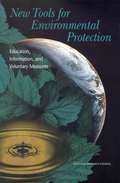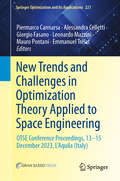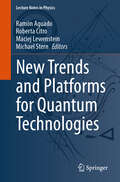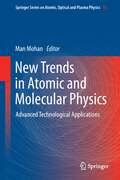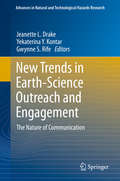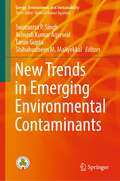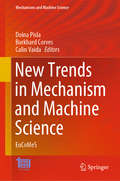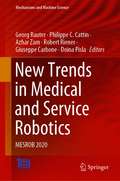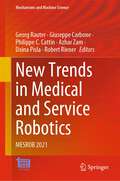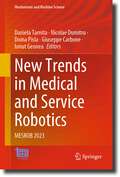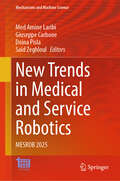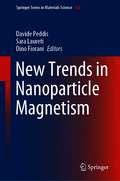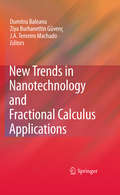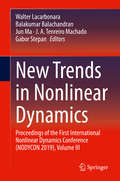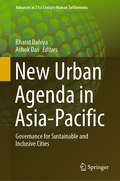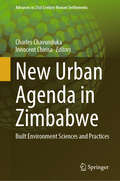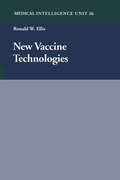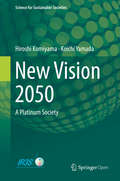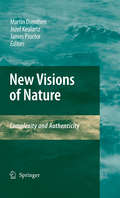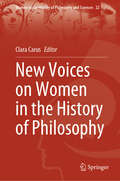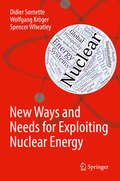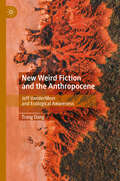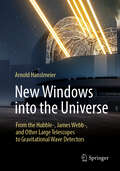- Table View
- List View
New Tools for Environmental Protection: Education, Information, and Voluntary Measures
by Committee on the Human Dimensions of Global ChangeMany people believe that environmental regulation has passed a point of diminishing returns: the quick fixes have been achieved and the main sources of pollution are shifting from large "point sources" to more diffuse sources that are more difficult and expensive to regulate. The political climate has also changed in the United States since the 1970s in ways that provide impetus to seek alternatives to regulation.This book examines the potential of some of these "new tools" that emphasize education, information, and voluntary measures. Contributors summarize what we know about the effectiveness of these tools, both individually and in combination with regulatory and economic policy instruments. They also extract practical lessons from this knowledge and consider what is needed to make these tools more effective.The book will be of interest to environmental policy practitioners and to researchers and students concerned with applying social and behavioral sciences knowledge to improve environmental quality.
New Trends and Challenges in Optimization Theory Applied to Space Engineering: OTSE Conference Proceedings, 13‒15 December 2023, L'Aquila (Italy) (Springer Optimization and Its Applications #221)
by Giorgio Fasano Alessandra Celletti Piermarco Cannarsa Leonardo Mazzini Emmanuel Trélat Mauro PontaniThe book consists of the proceedings of the workshop "New Trends and Challenges in Optimization Theory Applied to Space Engineering", held in l'Aquila (Italy), and organized by the Gran Sasso Science Institute (GSSI), on December 13-15, 2023. The main purpose of the book is to provide an overview of the most important current topics concerning optimal control in space. Optimal control theory is an exciting research area, where both new theoretical approaches and application problems come into play. The “New Trends and Challenges in Optimization Theory Applied to Space Engineering” conference brought together influential academic researchers and experts from industry and government to build bridges between their respective groups. The topics of the conference panels are selected to include the most advanced areas of interest for space applications. In line with the mission of the Gran Sasso Tech Foundation, interdisciplinary dialogue is promoted between the sciences, and different experts are encouraged to work together to identify new problems and generate new solutions. Covering a wide range of space-related topics and challenges, this conference aims to lay the foundation for a long-term collaboration between different groups of experts. A broad overview of control theory applications in space is presented, highlighting the most recent aspects, both from a theoretical and practical point of view, in particular on the following topics: - manifold dynamics, trajectory design and related control aspects; - AI techniques in guidance control problems and space missions; - optimization techniques for constellations with applications to space operations; - multi-stage control problems for launch and landing problems; - optimal control problems in the presence of uncertain parameters; - improved sufficient and necessary conditions in optimal control problems for space problems. New methods, specific mathematical models, ad hoc algorithms and heuristics, innovative mission scenarios, and advances in classical control theory are presented.
New Trends and Platforms for Quantum Technologies (Lecture Notes in Physics #1025)
by Michael Stern Roberta Citro Maciej Lewenstein Ramón AguadoThis book serves as a comprehensive introduction to quantum computing platforms, inspired by recent advancements in quantum technologies aimed at detecting and manipulating single quantum objects. Encompassing solid-state, atomic, and optical platforms, it delves into various aspects of quantum computing, including topological quantum computing. The content covers the fabrication, modeling, and numerical implementation of quantum circuits, such as Josephson junctions and qubits, along with hybrid nanostructures. Additionally, the book introduces quantum entanglement, a crucial concept for quantum communication and information processes. The well-compiled topics and concise presentation position the book as a primer for courses on quantum technologies.
New Trends in Atomic and Molecular Physics: Advanced Technological Applications
by Man MohanThe field of Atomic and Molecular Physics (AMP) has reached significant advances in high-precision experimental measurement techniques. The area covers a wide spectrum ranging from conventional to new emerging multi-disciplinary areas like physics of highly charged ions (HCI), molecular physics, optical science, ultrafast laser technology etc. This book includes the important topics of atomic structure, physics of atomic collision, photoexcitation, photoionization processes, Laser cooling and trapping, Bose Einstein condensation and advanced technology applications of AMP in the fields of astronomy, astrophysics, fusion, biology and nanotechnology. This book is useful for researchers, professors, graduate, postgraduate and PhD students dealing with atomic and molecular physics. The book has a wide scope with applications in neighboring fields like plasma physics, astrophysics, cold collisions, nanotechnology and future fusion energy sources like ITER (international Thermonuclear Experimental Reactor) Tokomak plasma machine, which need accurate AMP data.
New Trends in Earth-Science Outreach and Engagement
by Jeanette L. Drake Yekaterina Y. Kontar Gwynne S. RifePerhaps just as perplexing as the biggest issues at the core of Earth science is the nature of communicating about nature itself. New Trends in Earth-Science Outreach and Engagement: The Nature of Communication examines the processes of communication necessary in bridging the chasm between climate change and natural hazard knowledge and public opinion and policy. At this junction of science and society, 17 chapters take a proactive and prescriptive approach to communicating with the public, the media, and policy makers about the importance of Earth science in everyday life. Book chapters come from some 40 authors who are geophysical scientists, social scientists, educators, scholars, and professionals in the field. Bringing diverse perspectives, these authors hail from universities, and research institutes, government agencies, non-profit associations, and corporations. They represent multiple disciplines, including geosciences, education, climate science education, environmental communication, and public policy. They come from across the United States and around the world. Arranged into five sections, the book looks at geosciences communication in terms of: 1) Education 2) Risk management 3) Public discourse 4) Engaging the public 5) New media From case studies and best practices to field work and innovations, experts deliver pragmatic solutions and delve into significant theories, including diffusion, argumentation, and constructivism, to name a few. Intended for environmental professionals, researchers, and educators in the geophysical and social sciences, the book emphasizes communication principles and practices within an up-to-the-minute context of new environmental issues, new technologies, and a new focus on resiliency.
New Trends in Emerging Environmental Contaminants (Energy, Environment, and Sustainability)
by Avinash Kumar Agarwal Tarun Gupta Swatantra P. Singh Shihabudheen M. MaliyekkalThis book is based on recent trends for the research in emerging environmental contaminants in different compartment of the environment. It provides a recent understanding for the fate, transport, and degradation of emerging contaminants in different environmental sectors, including water, air, and soil. The contents discuss the fate and transport of microplastics, PPCPs, along with the method of detection and degradation. It includes removal of variety of pollutants including microplastics, pharmaceuticals, and personal care products from the water using adsorption technique, electrooxidation, membrane technology and other advance oxidation methods. This volume will be of great value to those in academia and industry involved in environmental science and engineering research.
New Trends in Macromolecular and Supramolecular Chemistry for Biological Applications
by Marc J. M. Abadie Mariana Pinteala Alexandru RotaruThis contributed volume applies the insights of supramolecular chemistry to biomedical applications such as ions/water transport through nano-scale channels, gene therapy, tissue engineering and drug delivery, to cite some of the major investigations.The challenge is to understand the mechanisms of transport through tissues particularly in the therapeutic treatment of a disease where the active drug must be delivered directly to diseased cells without affecting healthy cells. As a result, smaller quantities of active substances can be used to treat the disease. Another interest concerns new ways to administer gene therapy. If genes are often delivered to their target cells by adapted viruses, the supramolecular non-viral ‘vectors’ using dynamic nano-frameworks and nano-structures are presented. In addition, it is important to reconstruct damaged tissues by mimicking natural processes in cells and polymers, such as tissue engineering and self-healing. Different options are here discussed: e.g. hydrogels based on chitosan, a carbohydrate polymer, are proving especially promising for tissue engineering and drug delivery. For controlled delivery of drugs or other biologically active compounds, hydrogels sensitive to the most important stimuli in the human body, such as temperature, pH, ionic strength, glucose and biomolecules released by the organism in pathological conditions have been developed. Finally, to assist and validate the experimental studies, computer modelling and simulations of large-sized molecular structures and systems using different molecular dynamics and quantum mechanical techniques are developed based on the experimental and chemistry synthesis.This book is of great interest for graduate students, researchers and health professionals interested in acquiring a better understanding of the mechanisms of medical treatments. In addition, it provides numerous tools to develop better therapies for human diseases.
New Trends in Mechanism and Machine Science: EuCoMeS (Mechanisms and Machine Science #89)
by Burkhard Corves Doina Pisla Calin VaidaThis volume presents the latest research and industrial applications in the areas of mechanism science, robotics and dynamics. The respective contributions cover such topics as computational kinematics, control issues in mechanical systems, mechanisms for medical rehabilitation, mechanisms for minimally invasive techniques, cable robots, design issues for mechanisms and robots, and the teaching and history of mechanisms. Written by leading researchers and engineers, and selected by means of a rigorous international peer-review process, the papers highlight numerous exciting ideas that will spur novel research directions and foster multidisciplinary collaborations. They reflect the outcomes of the 8th European Conference on Mechanism Science (EuCoMeS) in 2020.
New Trends in Medical and Service Robotics: MESROB 2020 (Mechanisms and Machine Science #93)
by Robert Riener Giuseppe Carbone Doina Pisla Georg Rauter Philippe C. Cattin Azhar ZamThis book contains the papers of the 7th International Workshop on Medical and Service Robots (MESROB) that was planned to be held in Basel, Switzerland, in July 2020. Since the conference could not be held due to the worldwide Corona pandemic, the proceedings are published in this book and presentation of the accepted papers will be postponed to next year’s conference (MESROB 2021). The main topics of the workshop include: design of medical devices, kinematics and dynamics for medical robotics, exoskeletons and prostheses, anthropomorphic hands, therapeutic robots and rehabilitation, cognitive robots, humanoid and service robots, assistive robots and elderly assistance, surgical robots, human-robot interfaces, haptic devices, medical treatments, medical lasers, and surgical planning and navigation. The contributions, which were selected by means of a rigorous international peer-review process, highlight numerous exciting ideas that will spur novel research directions and foster multidisciplinary collaboration among different specialists, demonstrating that medical and service robotics will drive the technological and societal change in the coming decades.
New Trends in Medical and Service Robotics: MESROB 2021 (Mechanisms and Machine Science #106)
by Robert Riener Giuseppe Carbone Doina Pisla Georg Rauter Philippe C. Cattin Azhar ZamThis volume contains the papers of the 7th International Workshop on Medical and Service Robots (MESROB) which was held in Basel, Switzerland, on June 7-9, 2021. The main topics include: design of medical devices, kinematics and dynamics for medical robotics, exoskeletons and prostheses, anthropomorphic hands, therapeutic robots and rehabilitation, cognitive robots, humanoid and service robots, assistive robots and elderly assistance, surgical robots, human-robot interfaces, haptic devices, medical treatments, medical lasers, and surgical planning and navigation. The contributions, which were selected by means of a rigorous international peer-review process, highlight numerous exciting ideas that will spur novel research directions and foster multidisciplinary collaboration among different specialists, demonstrating that medical and service robotics will drive the technological and societal change in the coming decades.
New Trends in Medical and Service Robotics: MESROB 2023 (Mechanisms and Machine Science #133)
by Giuseppe Carbone Doina Pisla Daniela Tarnita Nicolae Dumitru Ionut GeoneaThis volume contains the papers of the 8th International Workshop on Medical and Service Robots (MESROB) which was held in Craiova, Romania, on June 7-10, 2023. The main topics include: design of medical devices, kinematics and dynamics for medical robotics, exoskeletons and prostheses, anthropomorphic hands, therapeutic robots and rehabilitation, cognitive robots, humanoid and service robots, assistive robots and elderly assistance, surgical robots, human-robot interfaces, haptic devices, medical treatments, medical lasers, and surgical planning and navigation. The contributions, which were selected by means of a rigorous international peer-review process, highlight numerous exciting ideas that will spur novel research directions and foster multidisciplinary collaboration among different specialists, demonstrating that medical and service robotics will drive the technological and societal change in the coming decades.
New Trends in Medical and Service Robotics: MESROB 2025 (Mechanisms and Machine Science #186)
by Giuseppe Carbone Doina Pisla Med Amine Laribi Said ZeghloulThis book contains the papers of the 9th International Workshop on Medical and Service Robots (MESROB) which was held in Poitiers, France, on July 2-4, 2025. The main topics include: design of medical devices, kinematics and dynamics for medical robotics, exoskeletons and prostheses, anthropomorphic hands, therapeutic robots and rehabilitation, cognitive robots, humanoid and service robots, assistive robots and elderly assistance, surgical robots, human–robot interfaces, haptic devices, medical treatments, medical lasers, and surgical planning and navigation. The contributions, which were selected by means of a rigorous international peer-review process, highlight numerous exciting ideas that will spur novel research directions and foster multidisciplinary collaboration among different specialists, demonstrating that medical and service robotics will drive the technological and societal change in the coming decades. Chapter "A Pneumatic HandHeld Device for Finger Active Tele-rehabilitation" is available open access under a Creative Commons Attribution-NonCommercial-NoDerivatives 4.0 International License via link.springer.com.
New Trends in Nanoparticle Magnetism (Springer Series in Materials Science #308)
by Dino Fiorani Davide Peddis Sara LauretiThis book provides comprehensive coverage of the most recent progress and developments in the field of magnetic nanoparticles, with special emphasis on new materials design approaches for magnetic nanoarchitectures, advanced characterization techniques, and a wide range of applications areas including permanent magnets, biomedicine, and life sciences. The book also features an exhaustive section on fundamentals, covering single particle effects, surface effects, and interparticle interactions. The book delivers a strong focus throughout on the multidisciplinarity of the subject spanning physics, chemistry, engineering, biology, medicine, and environmental science. This forward-looking contributed volume highlights future perspectives and areas of emerging research, and will be of great interest to advanced undergraduates, as well as researchers in academia and industry.
New Trends in Nanotechnology and Fractional Calculus Applications
by Dumitru Baleanu J.A. Tenreiro Machado Ziya B. GuvencIn recent years fractional calculus has played an important role in various fields such as mechanics, electricity, chemistry, biology, economics, modeling, identification, control theory and signal processing. The scope of this book is to present the state of the art in the study of fractional systems and the application of fractional differentiation. Furthermore, the manufacture of nanowires is important for the design of nanosensors and the development of high-yield thin films is vital in procuring clean solar energy. This wide range of applications is of interest to engineers, physicists and mathematicians.
New Trends in Nonlinear Dynamics: Proceedings of the First International Nonlinear Dynamics Conference (NODYCON 2019), Volume III
by Jun Ma Walter Lacarbonara J. A. Tenreiro Machado Balakumar Balachandran Gabor StepanThis third of three volumes from the inaugural NODYCON, held at the University of Rome, in February of 2019, presents papers devoted to New Trends in Nonlinear Dynamics. The collection features both well-established streams of research as well as novel areas and emerging fields of investigation. Topics in Volume III include NEMS/MEMS and nanomaterials: multi-sensors, actuators exploiting nonlinear working principles; adaptive, multifunctional, and meta material structures; nanocomposite structures (e.g., carbon nanotube/polymer composites, composites with functionalized nanoparticles); 0D,1D,2D,3D nanostructures; biomechanics applications, DNA modeling, walking dynamics, heart dynamics, neurodynamics, capsule robots, jellyfish-like robots, nanorobots; cryptography based on chaotic maps; ecosystem dynamics, social media dynamics (user behavior dynamics in multi-messages social hotspots, prediction models), financial engineering, complexity in engineering; and network dynamics (multi-agent systems, leader-follower dynamics, swarm dynamics, biological networks dynamics).
New Urban Agenda in Asia-Pacific: Governance for Sustainable and Inclusive Cities (Advances in 21st Century Human Settlements)
by Bharat Dahiya Ashok DasThis book explores significant aspects of the New Urban Agenda in the Asia-Pacific region, and presents, from different contexts and perspectives, innovative interventions afoot for transforming the governance of 21st-century cities in two key areas: (i) urban planning and policy; and (ii) service delivery and social inclusion. Representing institutions across a wide geography, academic researchers and development practitioners from Asia, Australia, Europe, and North America have authored the chapters that lend the volume its distinctly diverse topical foci. Based on a wide range of cases and intriguing experiences, this collection is a uniquely valuable resource for everyone interested in the present and future of cities and urban regions in Asia-Pacific.
New Urban Agenda in Zimbabwe: Built Environment Sciences and Practices (Advances in 21st Century Human Settlements)
by Innocent Chirisa Charles ChavundukaThis book presents ways of shaping the built environment sciences and practices for steering the New Urban Agenda in Zimbabwe. Attention to the built environment disciplines and practice is important because of their centrality to economic dynamism and sustainability of urban services. The reverse relationship is also true, because through provision of norms, aspirations, and guidelines; the New Urban Agenda helps in steering the built environment disciplines and practice. The book begins by exploring theoretical and conceptual material on the built environment concept. It recognizes that sub-Saharan African countries and Zimbabwe in particular are operating in a changing environment of rapid urbanization, unemployment, and inequality. Its premise is that the built environment sciences and practice can make a contribution to addressing sustainable development challenges through the introduction of innovations in infrastructure, institutions, and processes that enhance socio-economic growth and development. The book brings together scholarship from various disciplines in the built environment and presents sector initiatives such as those relating to curricula, smart technologies, and cutting-edge innovations in steering sustainable urban development.
New Vaccine Technologies
by Ronald W. EllisThis book systematically addresses all the major available direct and enabling technologies which have contributed to the revolutionized research and development, thus improvements to existing vaccines. Its target audience is both research and development workers in the field, as well as health-care personnel who use vaccines. It should serve as an
New Views of the Solar System
by Encyclopaedia BritannicaWhen the International Astronomical Union recently redefined the term 'planet'; Pluto was stripped of its designation as the solar system's ninth planet. New Views of the Solar System looks at scientists' changing perspectives on the solar system, with articles on Pluto, the eight chief planets, and dwarf planets that illustrate this 'new view'; Brilliant photos and drawings showcase the planets, asteroids, comets, and more, providing a stunning collection of vivid and detailed images of the solar system.
New Vision 2050: A Platinum Society (Science For Sustainable Societies Ser.)
by Hiroshi Komiyama Koichi YamadaThis book presents the "New Vision 2050," which adds the concept of the “platinum society” to the “Vision 2050”.The 20th century was a century in which energy led the development of material civilization, resulting in deletion of resources, global warming and climate change. What form should sustainable material and energy take to protect the Earth? The "Vision 2050" was established 20 years ago as a model that we should pursue for the next half century. Fortunately, the world is on course for the Vision 2050.The 21st century will be a century in which we seek qualitative richness, with the Vision 2050 as the material basis. That is, a “platinum society” that has resource self-sufficiency and resource symbiosis, and where people remain active throughout their lives and have a wide range of choices and opportunities for free participation. Since the author presented the concept of "Vision 2050" in 1999, the idea has been introduced in two books entitled Vision 2050: Roadmap for a Sustainable Earth (2008) and Beyond the Limits to Growth: New Ideas for Sustainability from Japan (2014). The latter includes a chapter that sheds light on the concept of a “platinum society”. In this publication, the author presents the "New Vision 2050" in more detail.
New Visions of Nature
by James Proctor F.W. Jozef Keulartz Martin A. Drenthen"New Visions of Nature" focuses on the emergence of these new visions of complex nature in three domains. The first selection of essays reflects public visions of nature, that is, nature as it is experienced, encountered, and instrumentalized by diverse publics. The second selection zooms in on micro nature and explores the world of contemporary genomics. The final section returns to the macro world and discusses the ethics of place in present-day landscape philosophy and environmental ethics. The contributions to this volume explore perceptual and conceptual boundaries between the human and the natural, or between an 'out there' and 'in here.' They attempt to specify how nature has been publicly and genomically constructed, known and described through metaphors and re-envisioned in terms of landscape and place. By parsing out and rendering explicit these divergent views, the volume asks for a re-thinking of our relationship with nature.
New Voices on Women in the History of Philosophy (Women in the History of Philosophy and Sciences #22)
by Clara CarusThis book promotes entirely new insights into women’s contributions to the history of philosophy and boasts papers spanning the centuries from Antigone until twentieth century phenomenology, covering fields from logic to mysticism, stretching from Brazil to Early Modern Europe. The book is of interest for all scholars and students of the history of philosophy, but especially for those who are interested in women philosophers and in new narratives in the history of philosophy. The book is representative of the immense scope of academic discussion women were involved in over the centuries as well as their varying styles and methods. It features papers in logic and in mysticism, presents papers on female authors in Antiquity and in the twenty-first century and it includes papers on phenomenology and analytic philosophy. The chapters consider philosophical positions in literature and drama, in letters and in classical philosophical treatises, ensuring this book contributes significantly to research on the individual women authors, who are all to date still understudied figures.
New Ways and Needs for Exploiting Nuclear Energy
by Didier Sornette Wolfgang Kröger Spencer WheatleyThe history of mankind is a story of ascent to unprecedented levels of comfort, productivity and consumption, enabled by the increased mastery of the basic reserves and flows of energy. This miraculous trajectory is confronted by the consensus that anthropogenic emissions are harmful and must decrease, requiring de-carbonization of the energy system. The mature field of indicator-based sustainability assessment provides a rigorous systematic framework to balance the pros and cons of the various existing energy technologies using lifecycle assessments and weighting criteria covering the environment, economy, and society, as the three pillars of sustainability. In such a framework, nuclear power is ranked favorably, but since emphasis is often placed on radioactive wastes and risk aversion, renewables are usually ranked top. However, quantifying the severity of the consequences of nuclear accidents on a rough integral cost basis and balancing severity with low core-damage accident probabilities indicates that the average external cost of such accidents is similar to that of modern renewables, and far less than carbon-based energy. This book formulates the overall goal and associated unprecedented demanding criteria of taming nuclear risks by excluding mechanisms that lead to serious accidents and avoiding extremely long stewardship times as far as possible, by design. It reviews the key design features of nuclear power generation, paving the way for the exploration of radically new combinations of technologies to come up with “revolutionary” or even “exotic” system designs. The book also provides scores for the selected designs and discusses the high potential for far-reaching improvements, with small modular lines of the best versions as being most attractive. Given the ambition and challenges, the authors call for an urgent increase in funding of at least two orders of magnitude for a broad international civilian “super-Apollo” program on nuclear energy systems. Experience indicates that such investments in fundamental technologies enable otherwise unattainable revolutionary innovations with massive beneficial spillovers to the private sector and the public for the next generations.
New Weird Fiction and the Anthropocene: Jeff VanderMeer and Ecological Awareness
by Trang DangThis book explores the development of ecological awareness in Jeff VanderMeer's New Weird novels, focusing specifically on the Southern Reach (2014-2024) and Borne (2017-2019) series. Examining the New Weird genre as an understudied part of climate fiction, the chapters investigate how these texts' language, content, and form develop unique and fascinating ways in which one can think and live more ecologically. As the first book-length study on VanderMeer's work to contextualize his novels through object-oriented ontology (OOO), an emerging branch of speculative philosophy that investigates how things exist, this work enables a uniquely experimental reading of VanderMeer: one that accentuates how his work unsettles what is perceived as normal and exposes the bounds of human reasoning, as well as how we understand ourselves and our relationships with nonhumans. Dang also engages with interdisciplinarity, situating VanderMeer's work within cultural discourse around the Anthropocene, environmental anthropology, prehistoric archeology, evolutionary biology, and Indigenous studies.
New Windows into the Universe: From the Hubble-, James Webb-, and Other Large Telescopes to Gravitational Wave Detectors
by Arnold HanslmeierThe observation capabilities of modern astrophysics are constantly increasing. They range from optical telescopes and space telescopes in the infrared to radio telescopes, and from gravitational wave detectors to neutrino observatories. While some focus on light in space, others examine the smallest particles underwater or measure disturbances in spacetime smaller than the diameter of a proton. This book offers an exciting and comprehensive overview of our technical capabilities to explore the universe. It is just as suitable as a foundation for a lecture in astronomy or astrophysics as it is for reading by those interested in the natural sciences.
